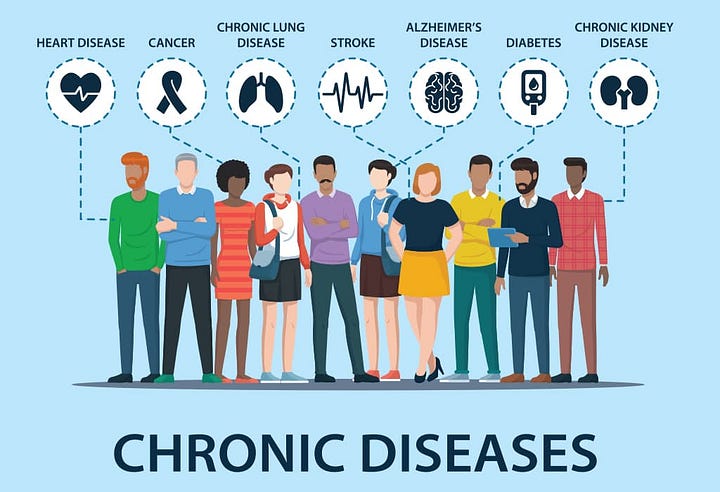Diet and Nutrition and Chronic Diseases

Role of Diet in Chronic Diseases
Diet and nutrition are important factors in the promotion and maintenance of good health throughout the entire life.
Chronic diseases are long-term diseases that are not contagious and largely preventable. They include diseases such as obesity, diabetes, cardiovascular diseases, skin, cancer, osteoporosis, and dental diseases.
These are the risk factors for developing chronic diseases –
Unhealthy diet, sedentary lifestyle, tobacco, and alcohol consumption.
Genetic and economic factors also play an important role in developing these diseases.
Through diet modification, daily physical activity and dedication, and discipline chronic diseases can be preventable. Changes in the diet that may be helpful in reducing the risk of chronic diseases include eating a diet that is low in fat and sugars and rich in fruits, vegetables, and wholegrain foods.
What are the combined effects of different risk factors over time?
The overall risk of developing chronic disease depends on several factors and how they interact throughout life.
Risk factors can combine together, and increase the risk of developing a disease.
For instance, children and adolescents with unhealthy diets and lifestyles tend to be affected simultaneously by factors such as impaired glucose tolerance and elevated blood pressure.
Combinations of unhealthy habits such as excessive television viewing and lack of exercise add to the risk. In older children and adolescents, regular alcohol and tobacco use also contributes to high blood pressure which can lead to other risk factors in early adulthood.
Chronic diseases such as obesity, and unhealthy habits such as smoking during pregnancy, can affect the health of the next generation.
How can chronic disease be prevented?
It is possible that maintaining a healthy lifestyle can prevent and control chronic disease. Major risk factors that have been proven to contribute to chronic diseases are unhealthy diets, lack of physical activity, alcohol, and smoking.
Taking steps to reduce risk factors throughout life can have a massive impact on the control of the chronic disease.
A lifestyle combining physical activity, food variety, and social interaction is the most conducive to good health. A diet should include a balanced amount of micro and macronutrients that are required for optimal health. It is generally recommended to increase the consumption of fruits, and vegetables, and to adjust the types of fats and oils consumed, as well as the number of sugars and starch in the diet.
The promotion of healthy lifestyle choices should be undertaken and ensure that guidelines reach everybody, creating health-promoting environments, particularly for those most at risk.
